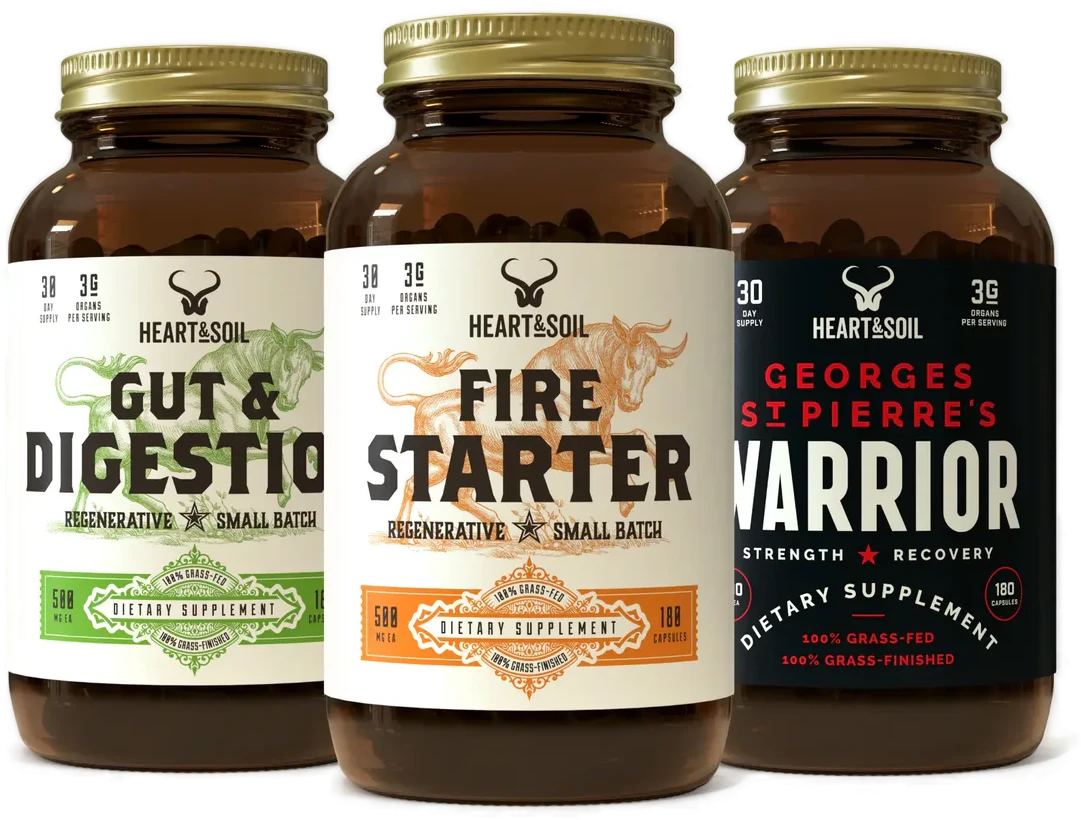Weight has become a significant issue for individuals worldwide (especially in the United States). Around 72% of American adults are overweight, with 42% classified as obese (1).
Unsurprisingly, diet and lifestyle habits have changed dramatically in the United States (2); the majority of calories we consume in the US come from cheap and highly-processed foods, people dine out more frequently, jobs are more likely to be sedentary, and most of us now travel by vehicle to school, work, or other functions instead of traveling by foot.
Being obese or overweight can lead to increased medical expenses and an increased likelihood of challenges such as type 2 diabetes, stroke, cancer, and cardiovascular disease (3).
If you’re reading this, you’ve likely tried various diets, workout programs, and supplements in the past with no luck. This can be incredibly frustrating, but you’re not alone. For the typical dieter, over 80% of lost weight is gained back after five years (4). This can be connected to biological, mental, or environmental factors.
In this article, we’ll discuss strategies for eating an animal-based diet for fat loss. We’ll also highlight key lifestyle factors like sleep, exercise, and stress, as these can help you keep the weight off and improve your overall health along the way!
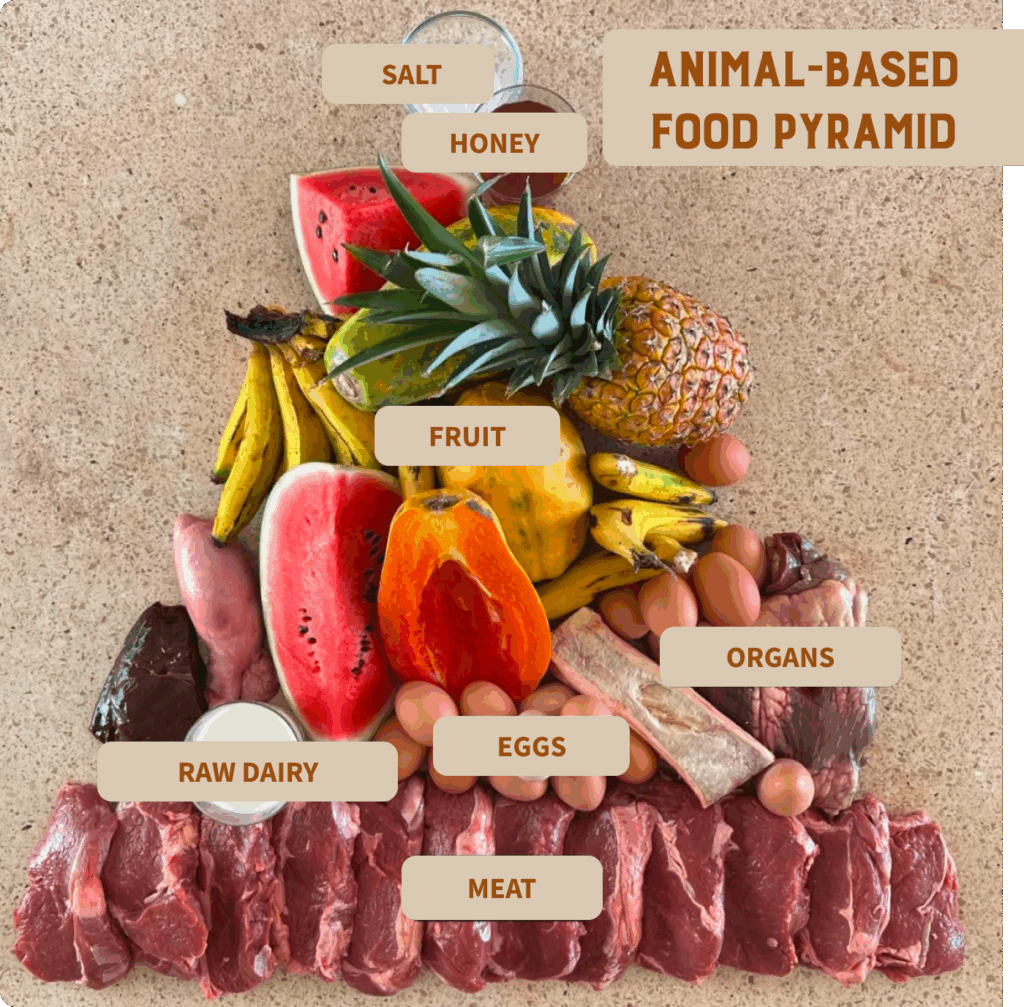
Is Fat Loss Possible on an Animal-Based Diet?
We’ve seen the following suggestions work for countless people, but it’s essential to remember that there’s no “one size fits all” approach.
You are about to learn the overarching principles to using an animal-based diet for fat loss so you can live your life without feeling like your diet is restricting you.
Our primary focus is to improve your overall health so you can find lasting results.
Disclaimer: If you’re looking for a quick fix, this is not the place! This is not the fastest way to lose weight, but it can be incredibly effective.
We believe following these 4 key principles will allow you to lose weight effectively:
- Prioritize high-quality, nutrient-dense foods
- Eliminate processed foods
- Integrate lifestyle habits that promote muscle-building and fat burning
- Practice routines that promote recovery and stress management
Let’s unpack these principles and start your weight-loss journey!
Animal-Based Diet for Fat Loss: Do This First
The best way to lose fat is to get healthy first and heal your metabolism.
A healthy metabolism helps:
- Heal and prevent chronic illness
- Burn more calories at rest and during activity
- Maintain body composition
So, how do you heal your metabolism?
Feed your body plenty of nutrient-dense foods multiple times a day. You can support your metabolism through an animal-based diet with plenty of nutrient-dense protein, fats, and carbohydrates.
Before we go any further, let’s define an animal-based diet: meat, organs, fruit, raw honey and raw dairy. Now that we got that out of the way, let’s talk more about healing your metabolism to lose fat.
Losing fat-specific weight is not about starving your body by fasting longer or eating less (read that again, it’s important). In fact, you’ll likely consume more food than before in order to increase your metabolism (5).
You may not lose weight as quickly as you desire, and yes, you may even gain weight (at first); however, in the long term, you will feel better. We frequently see people with increased energy, libido, and mood before they steadily chip away at their weight-loss goal.
Make Sure You’re Eating Enough
Sounds wild, right? It’s not! Your focus should be on eating enough high-quality, nutrient-dense calories to give your body the signal of abundance, which equates to healthy hormones, weight, and overall improved quality of life.
Does this mean you should never enter a caloric deficit? Nope. This truly is meant to serve as a reminder that losing weight is a journey and not to get stuck in a “calorie-deficit prison”—less food and more fasting.
While well-intentioned, poor dieting habits (like under-eating or crash-dieting) are widespread due to misconceptions about weight loss.
Fat Loss Takes Time, So Be Patient
Optimizing hormones, losing fat, building muscle, and feeling your absolute best won’t happen overnight.
The scale might go up and down, but that’s because it takes time to revive the metabolism. Losing weight too quickly can disrupt hormones, satiety, strength, energy, recovery time, libido, and more (6,7,8,9).
A slow-and-steady approach to eating an animal-based diet for fat loss can help reduce the amount of muscle lost in the process, which is essential because reserving muscle mass accelerates fat loss and helps keep it off (10)!
Now, let’s take a look at the finer details when it comes to your diet!
Animal-Based Diet Suggestions: Keep It Simple!
Fat loss doesn’t have to be overly complicated. Our 3 leading dietary suggestions revolve around choosing natural foods instead of processed foods (11, 12).
These suggestions are:
- Prioritize protein intake from ruminant animals (cattle, buffalo, goat, lamb, deer)
- Focus on high-quality fats and low-toxicity carbohydrates
- Avoid vegetable oils and other processed foods
Simple enough!
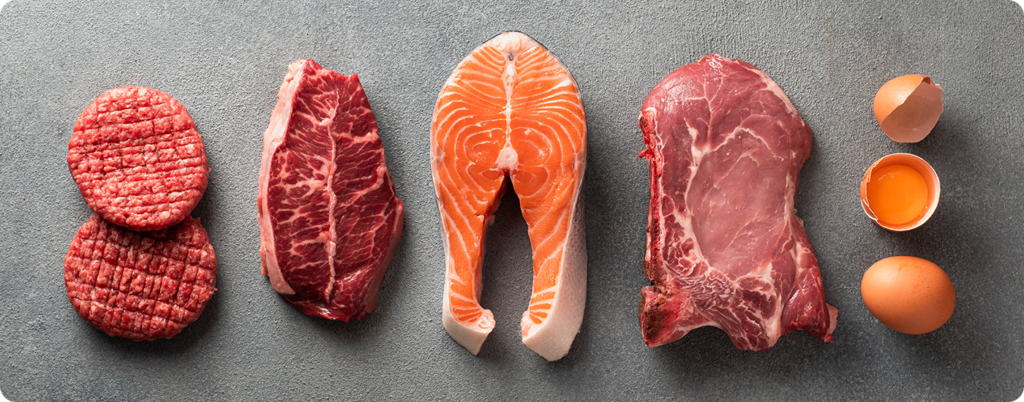
Prioritize Protein
The most important part of eating an animal-based diet for fat loss is to prioritize protein. Remember, your goal is to lose fat, not muscle. Start by building each meal around protein. This will do 2 things:
- Keep you satiated and stop you from overeating.
- Make sure you hit your protein goals, before loading up on carbs (which is where post people go wrong)
We suggest consuming 1-1.2 grams of protein per pound of desired body weight.
For example, if your goal weight is 150 lbs, you would consume about 150-180g of protein, or about 1.5-1.8 lbs of well-raised, grass-fed, grass-finished ruminant muscle meat daily.
Remember, you don’t have to eat ribeyes and New York strip steaks to hit your daily protein goals! We frequently suggest cheaper cuts such as stew meat, chuck roast, Denver steaks, and ground beef for a more affordable approach. This protein intake can also be met through eggs, cheese, milk, and other sources.
Don’t forget about organ meats, which can also be helpful for weight loss!
In particular, liver and heart contain nutrients crucial for supporting natural pathways that improve energy production (13), healthy weight (14), and maintaining high-quality muscles. If you cannot consume fresh organs, then Warrior is a great supplement to implement.
Fat Loss Stack
Grass-Fed Organs for Metabolic Health
Fat and Carbohydrates
Your fats should ideally come from sources that contain stearic acid, a crucial fatty acid that will help turn those mitochondria “on” and shift them into a “fat-burning” mode. It can also aid satiety, weight loss (15), and proper hormone function (16). Our favorite sources of stearic acid are grass-fed, grass-finished suet, bone marrow, tallow, ghee, or butter.
For carbohydrates, we suggest sticking to low-toxicity sources such as organic ripe fruit, raw honey and maple syrup.
We suggest 0.8-1 gram of fat per pound of ideal body weight, and 0.7-1.2g of carbohydrates per pound.
Using the same example as before, if your goal body weight is 150 lbs, your daily target would be 120-150g of fat, and 105-180g of carbohydrates.
You have our permission to experiment with these numbers depending on your activity level. If your total activity level is lower and you find it difficult to lose weight, you might experiment with the lower end of the range. However, if you are more active and are losing weight steadily, you could try the higher end of the range.
Don’t get too caught up with exact numbers. Aim to experiment and find what makes your body feel the best! It can be helpful to use an app like Cronometer to track your intake easily.
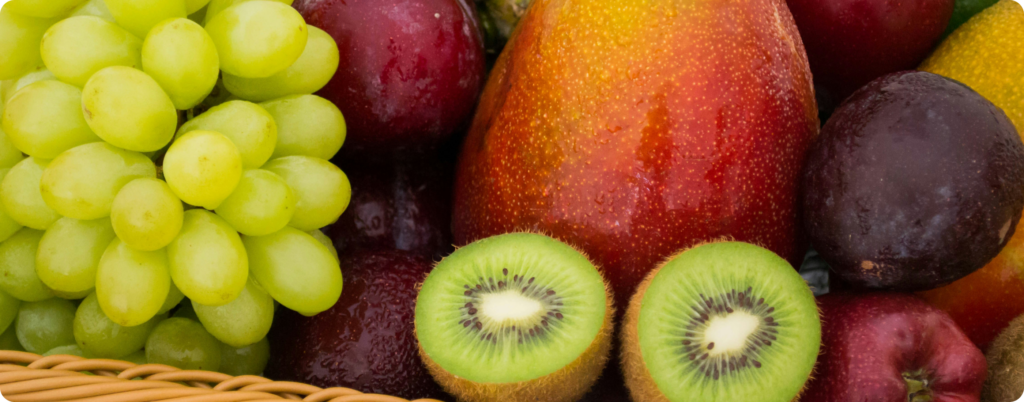
Avoid Seed Oils At All Costs
Seed oils have been silently wreaking havoc on our bodies for decades.
So it’s important to remain vigilant in avoiding them.
This is a difficult task because they are everywhere within the modern Western diet. Nearly every bagged or boxed food contains vegetable oils, and almost every restaurant uses them to cook with.
Vegetable/seed oils (corn, canola, cottonseed, safflower, sunflower, soybean oil, etc.) contain an unnatural amount of polyunsaturated fatty acids, and we believe they are the primary driver of metabolic dysfunction.
We work with many people asking why they have stalled out on their weight loss. From our experience, excess linoleic acid (an omega-6 polyunsaturated fatty acid) consumption from seed oils is the primary driver of these issues.
Even conventionally raised monogastric animals (such as chicken, pork, or turkey) fed diets high in corn and soy will store linoleic acid in their adipocytes in amounts that we did not see evolutionarily and can contribute to this stall. It’s the same story for eggs, so we suggest consuming 100% corn- and soy-free eggs or none.
Thankfully, it’s possible to get corn-and-soy-free chicken from local farmers, White Oak Pastures, or Nose To Tail.
Try replacing unhealthy seed oils with healthy fats like grass-fed ghee, tallow, butter or suet.
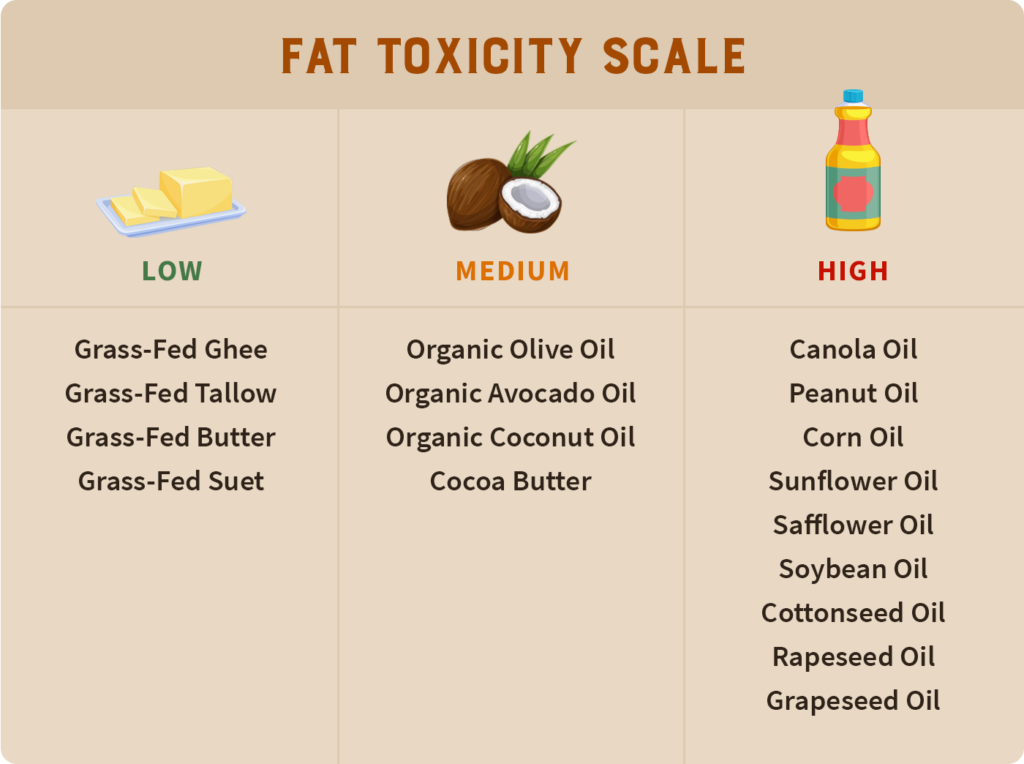
As with any health goal, diet is crucial, but it’s only part of the picture. Focusing on key lifestyle practices can significantly contribute to weight loss as well.
Lifestyle Habits We Recommend
Weight loss is not only about the foods you eat. It’s also about your lifestyle as well.
We suggest incorporating exercise, rest and recovery, stress management, environmental hormesis (cold plunge, sauna), and sunlight.

Each of these can contribute to sustained weight loss:
- Movement and Exercise: aim to complete some level of physical activity daily. It can be as simple as going for a long walk, paddleboarding, or riding a bike. Bonus points if you incorporate weights for strength training (17)!
- Sleep Quality: optimizing sleep is crucial for weight loss! Shortened or poor sleep quality can impact decision-making around food intake and contribute to weight gain (18, 19, 20).
- Sunlight: daily sun exposure can help the body enter its natural circadian rhythm cycle, which promotes sleep (21), recovery, muscle growth, and weight loss.
- Stress Management: we challenge everyone to engage in some stress management activity. Meditation, prayer, sitting outside and connecting with nature, gardening, or even learning a new skill can all be enjoyable ways to reduce stress (22, 23, 24).
- Cold Exposure: cold therapy provides so many benefits to help strengthen the immune system and improve vascular health. It also aids in fat burning by shifting white adipose (fat) tissue to brown, more metabolically active adipose tissue (25, 26).
- Sauna: weekly high heat exposure can dramatically improve the immune system and vascular health (27,28,29,30).
So, what if you’ve read this far and say, “I’m already doing all this!” Well, we have some insight into why you may not yet see the intended results…
Why Am I Not Losing Weight?
Here are 4 extra questions to help you tweak your diet and lifestyle to accelerate weight loss:
- Do you know if the weight you have gained is indeed fat? Could it be water weight or increased muscle mass?
When we raise our red meat intake, we also increase our creatine intake. This can result in muscle growth and increased water retention in the muscles. Increasing salt and fruit intake—like on an animal-based diet—can also increase muscle water retention. - Are you coming from a ketogenic or other low-carb diet?Individuals on a keto/carnivore diet for an extended time may have negatively altered their metabolism in a way that favors weight gain or plateaus.
- Are you consuming any non-caloric sweeteners or keto food products?
Dr. Paul discusses how such ingredients can interfere with fat loss and cause other health issues. - Is there a deeper root cause to consider?
Some health challenges, such as exposure to environmental toxins (mold, heavy metals, etc.), can throw a wrench in your weight-loss goals. If you’re already dialed in with diet and lifestyle, it could be worth working with a functional medicine professional for additional testing.
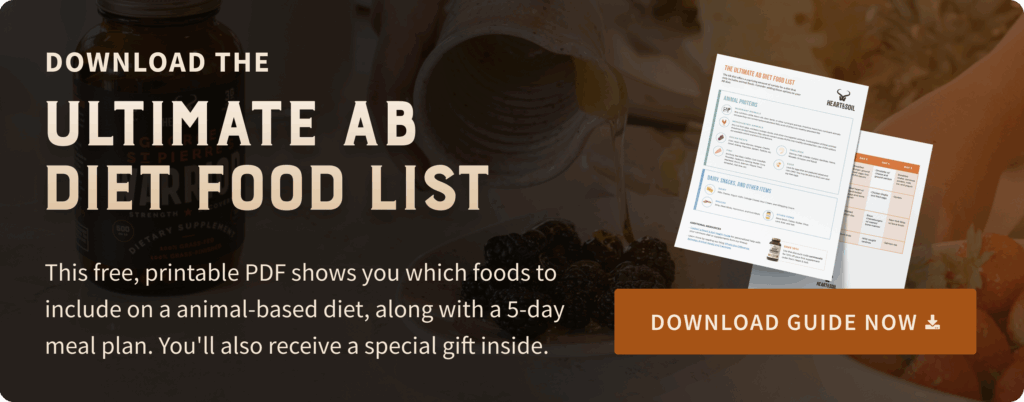
Remember Your “Why”
The desire to achieve your weight loss goal as soon as possible is understandable. Patience is key! With consistency and time, the body is capable of incredible healing.
It’s possible to support this process by prioritizing nutrient-dense foods such as meat and organs (in sufficient quantities) in favor of processed foods. Getting healthy first to lose weight helps boost your metabolism and embark on a path toward lasting weight loss.
You will face challenges along the way, whether it be a change of routine from travel or a “bad” meal at a restaurant with friends. That’s perfectly fine! Remember your “why”, get back on track, and remain consistent with your newfound healthy habits.
As always, if there’s anything we can do to support your journey, please contact us at [email protected]!
Subscribe to future articles like this:
